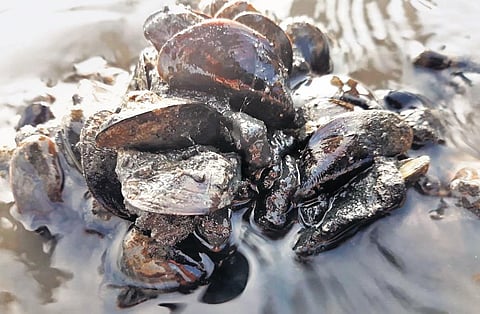

CHENNAI: Eleven of 52 fishing sites in Ennore have been infested by an alien mussel species, wiping out valuable fisher resources like locally prevalent yellow clams (manja matti) and green mussels (pachai aazhi).
Identified as ‘Mytella strigata’ or Charru mussels native to South America the mussels threaten to spread their tentacles into the ecologically sensitive Pulicat lake, which attracts migratory birds annually.
Tamil Nadu State Wetland Authority Deepak Srivastava said a scientific study would be commissioned shortly to understand its source and spread. Fisherman and principal author of a study on the species, S Kumaresan from Kattukuppam on Tuesday petitioned the authority calling for action.
Around two decades ago, local fishers spotted the species on the Ennore wetlands, found the study by Kumaresan, Ennore fishers, and environmentalists associated with the Save Ennore Creek Campaign.
The mussels have now spread and carpeted over 6 km of the river bed, preventing prawns from grazing or burying themselves in the river sediment. The species sucks in and processes hundreds of litres of water daily, resulting in a clear water column.
This clear water hampers fishing activity as nets would be visible to the fish. The river bottom is also choking with nearly a foot-deep sludge of black, foul-smelling excreta.
Human interference in the wetlands, pollution, and nature’s actions have turned this insignificant incidence into a full-fledged infestation, Kumaresan says. “Beginning 2017, after the December 2016 Vardah cyclone, the mussels began to intensify and spread to occupy stretches far north towards the Pulicat waters. We think the storm surge may have something to do with the spread. The firm ash-covered river bottom is helping the kaaka aazhi expand its territory. The problem has become severe since April 2022,” he said.
Fishers and activists suspect unchecked discharge of ballast waters from ships visiting the Kattupalli ports may have resulted in the spread. Responding to this allegation, Srivastava said the wetland catchment and drainage system need to be studied to fix accountability. “An integrated management plan will be prepared to address the livelihood loss.”
A few years ago, Kerala too reported damage due to the spread of this species. Surveys found the presence of the Charru mussel in the state’s backwaters, including Kadinamkulam, Paravur, and Ponnani.
Gradually, Ashtamudi Lake a Ramsar site in Kollam was deemed the worst hit. Here, the mussel replaced the Asian green mussel and the oyster ‘Magallana bilineata’.